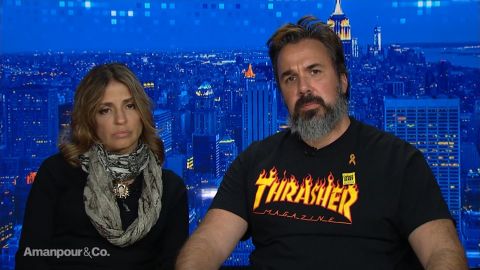Read Transcript EXPAND
DAVID HOGG: Over the past year, we have gotten over set over 67 new gun laws passed in over 25 states. In several states, we enacted extremist protection orders which give people the ability to disarm people like domestic abusers and people that are risk themselves and others through due process. And all the amazing work that’s been done this year because of the advocacy of groups like March For Our Lives, like Moms Demand Action, like Giffords and like the Brady Campaign.
CHRISTIANE AMANPOUR: Because you have taken on this massive political social cultural burden, if you like, or struggle, you’re only 18, you were 17 when this happened, I think, have you have the time yourself along with your sister, along with your friends to grieve and to mourn what happened or do you feel that you’ve been thrust into a political route so heavily?
HOGG: So, it’s interesting that you say that because grieving is supposed to be a natural process of after you lose somebody, but you can’t grieve after an instance like this because you don’t lose people to gun violence, people are stolen from us due to gun battle. People don’t just happen to die as a result of old age in this instance, they happened to die as a result of a man or woman with a gun. So, what I work to do on a daily basis and my way of grieving is by going out there and making sure that no matter whether people hate me or love me they realize that we can’t — the second we start debating these issues and the second we start talking and yelling at each other and not fighting against the source of evil which is gun violence is a second we lose as Americans because that’s when somebody else dies as a result of preventable gun violence. As Americans and human beings across the world, we have to realize that we cannot fight against each other when we’re trying to solve an issue like gun violence, we have to fight against gun violence as the source of that evil.
AMANPOUR: And fight together presumably against that evil. But I just want to pick up on what you have just said, “No matter if people love me, support me or stay hate me, this is what I have to do,” just talk about that a little because you have received so much support in your own country and around the world but you have also received a certain amount of the haters, you know, the people who simply don’t want to see you standing up to gun violence. What sort of hate if you had to absorb over the last year?
HOGG: Oh, a massive amount. But I don’t feed into it because I realize that is not what is going to end gun violence. What’s going to end gun violence is by getting people who hate me and the people who love me to work together with the understanding that even though you may not believe in new gun laws, even though you may not support us in our efforts, the one thing that I think we can agree on as human beings is that preventable gun violence is an issue that must be addressed in the United States.
About This Episode EXPAND
Christiane Amanpour looks back at the school shooting one year ago at Marjory Stoneman Douglas High School. Hari Sreenivasan speaks with the playwright of “The Ferryman” and actress Laura Donnelly.
LEARN MORE



